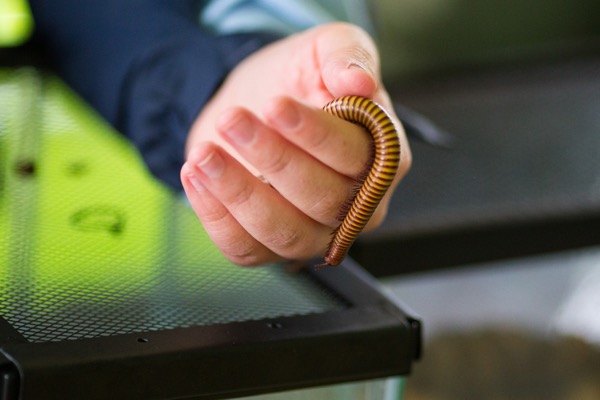


Insect carnival
Photo by Kevin Quinlan May 20, 2016
Entomology Club hosts Insect Carnival Extravaganza at Blue Hen Fandemonium
The Entomology Club at the University of Delaware set up an Insect Carnival Extravaganza on Saturday, May 7, as part of UD Athletics’ Fandemonium event.
The five-table exhibit catered to the Future Hens Club, which is open to children ages 12 and younger, though the club members interacted with the general public as well in an effort to raise awareness on the importance of insects.
The exhibit included an insect zoo, a variety of live arthropods such as tarantulas and cockroaches, and the club handed out milkweed seeds and milkweed plants to help promote monarch butterfly conservation.
Zach Schumm, a senior double majoring in entomology and wildlife conservation and the president of the entomology club, said the group also sold milkweed seeds and plants at Ag Day and used those that were remaining at Fandemonium.
“It’s one of those things that people don’t really promote because they think of milkweed as just a weed that you need to pull and get rid of but it’s the only food source for monarch butterfly caterpillars, so we try to promote it as much as we can,” said Schumm, who added that it was great to be able to connect with an audience that might not otherwise be in an ecological mindset.
“The parents were there, and they have gardens at their homes, so we let them know that this is what we would think of as a weed but it’s really important for insects. Not all the pretty flowers we buy at the store are native and beneficial to us. I think the educational aspect of this really clicked with a lot of people,” said Schumm.
Cassandra Ference, a senior double majoring in entomology and wildlife conservation with a minor in statistical data analytics, is the outreach coordinator for the Entomology Cluband helped organize the exhibit. She said the group doesn’t want people to be repelled by insects but to see their integral and important role in providing ecosystem services.
“Insects break down material, like carcasses and leaves, and they’re detritivores, which means that they break down dead material, and basically they work on nutrient cycling for trees and other plants,” said Ference. “They’re food for lots of other animals and birds in our world. They’re also indicators of good water quality. Mayflies, for example, have certain tolerances that they can only survive in good water, essentially.”
Ference also pointed out that pollination services are provided by a wide array of insects.
“That’s probably one of the most important services. That and nutrient cycling are some of the most important ones,” Ference said. “People think bees are the only pollinators but that’s not true. Beetles pollinate, flies pollinate – there are lot of different insects that pollinate.”
Schumm said he thinks connecting research and science with the public is a mission that can have lasting impacts and tangible results.
“I think there’s this gap between people doing research and the public. We can keep publishing all these papers, and that is really important and we’re getting a lot done, but we need to get the public informed and on board, as they can play a huge role in the effectiveness of programs implemented from what we learn from research,” said Schumm.
Youth engagement
The majority of the exhibit was geared toward children, and Ference said that the club has worked with area schools in the past.
“We do outreach with schools and a lot of times the schools will call us. I’ve done a few programs where we go out and do a presentation on what an entomologist is, why bugs are important, what an insect is,” said Ference.
Schumm said he thinks it is important to get kids exposed to insects and their importance at an early age.
“I think teaching youth is one of the more important things because kids are really interested in insects and the environment but they don’t get much exposure to it depending on what school system they’re in. Reaching out to the youth and starting with the youth is really important and I enjoy doing it,” said Schumm.
Entomological interests
As to how she got involved in entomology, Ference said she wasn’t into insects until she got to UD and took a class with Deborah Delaney, assistant professor of entomology in the Department of Entomology and Wildlife Ecology.
“When I started here, I was a wildlife conservation major and I was dreading taking this Elements of Entomology class because I didn’t like bugs, but that class changed everything for me. I immediately added on the entomology major and started doing research with Dr. Delaney. She changed everything for me. I am such a big advocate of insects now,” said Ference.
With graduation right around the corner, Schumm said he plans to work at the United States Department of Agriculture Beneficial Insects Introductory Laboratory located on the Newark Farm. There he will study brown marmorated stink bugs.
He also plans to work more with his company, SchumBug, which provides displays of insects and artwork at birthday parties and at local universities and science centers.
“It’s been tough to keep SchumBug going while I’m in school so, hopefully, after graduation I’m going to spend some time and actually try to see what I can do with it. I really enjoy the teaching aspects of everything, so it’s fun to do,” said Schumm.
For more information on the Entomology Club, visit the club’s website.
Contact Us
Have a UDaily story idea?
Contact us at ocm@udel.edu
Members of the press
Contact us at 302-831-NEWS or visit the Media Relations website

